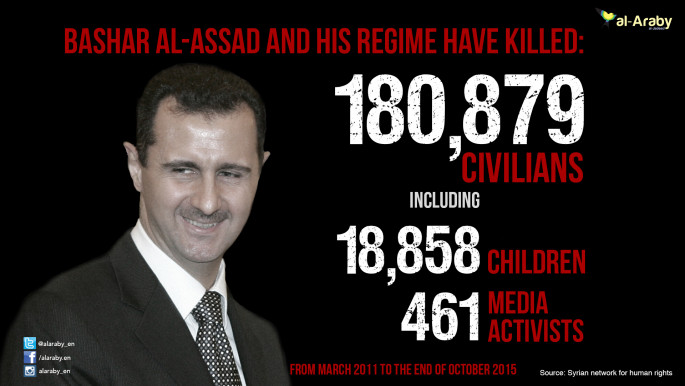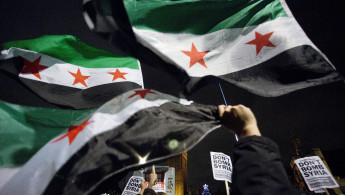Syrian opposition groups will gather in Saudi Arabia on Tuesday to unify their stance ahead of potential talks with the regime of President Bashar al-Assad whose fate remains a point of contention.
It will be the first time representatives of the political opposition and military factions fighting the regime have come together since the conflict began in 2011.
Saudi Arabia is hoping to unite the opposition ahead of talks between parties to the conflict which world powers hope to hold before 1 January.
Some hundred representatives are likely to attend the meeting on Wednesday, including Saudi-backed Jaish al-Islam (The Army of Islam), an amalgam of factions that include hardline Islamists, which is not listed as a terrorist group.
|
| |
Here are some of the factions and figures believed to have been invited:
Syrian National Coalition
The leading opposition grouping in exile, created in Doha in November 2012, will send 20 delegates to Riyadh.
It includes members from across the political and ethnic spectrum and represents some military forces, though it is often accused of being removed from the realities on the battlefield.
It has been recognised by 120 countries as the representative of the Syrian people and participated in two rounds of peace talks in Geneva with regime delegates in 2013 and 2014.
It is currently headed by Khaled Khoja, and is based in Turkey.
Cairo Conference
Formed in January 2015, the grouping brings together some 150 domestic and exiled opposition figures, including Kurds.
One of the group's co-founders is Haytham Manaa, a longtime dissident.
It will send around 20 delegates to the meeting.
National Coordination Committee for Democratic Change
The leading Syria-based opposition body, founded in 2011, includes leftist, nationalist and Kurdish parties as well as individual dissidents.
It has staunchly opposed foreign intervention in Syria and its continued existence inside the country has been tolerated by the regime, though its members have been harassed and arrested.
It participated in talks organised by Moscow on the conflict in 2014 and 2015.
Independent figures
A handful of independent dissidents, including activists and businessmen may also figure among the participants, though their names have not been made public so far.
Armed factions
Some 15 representatives from armed factions are expected to attend the conference, according to one source, but the details of which groups are being invited remain murky.
The only group to confirm it has been invited is Jaish al-Islam, a powerful movement mostly active around Damascus, but the group has not said if it will attend.
The Western-backed Southern Front coalition, which operates in southern Syria, is thought to be another invitee, but has not said so officially.
There have also been reports that Ahrar al-Sham, perhaps the most powerful non-extremist opposition force in the country, will be among the invitees.
|
|
|
|
|
|
The invitees do not include those considered to be "terrorist", such as the Islamic State group and al-Qaeda's Syrian affiliate al-Nusra Front.
Kurdish factions are also not invited.
"The mission is difficult and risky," said Samir Nashar, a member of the Istanbul-based National Coalition, the main Syrian opposition grouping.
He said the aim was to "agree on a common and clear position concerning the future of Syria, the transition and the stance on (the fate of) Bashar al-Assad."
Last month, top diplomats from 17 countries - including key international backers and opponents of Assad - met in Vienna in search of a political solution to Syria's war, which has seen 250,000 people killed since March 2011.
'Core differences' over Assad
Those nations included the United States and Saudi Arabia which back the opposition, and Russia and Iran, Assad's main supporters.
They agreed on a fixed calendar for Syria that would see a transition government set up in six months and elections within 18 months.
Speaking of "core differences" over Assad's fate, Nashar said he feared that "some groups close to states supporting the regime, could demand that Assad stays during the transition period".
"This risks causing the failure of the meeting," he said.
Groups supported by the United States, Saudi Arabia and Qatar demand Assad's rapid departure, a condition that Iran and Russia continue to oppose.
"The opposition still demands the departure of Assad at the beginning of the transition period," insisted Ahmed Ramadan, another National Coalition member.
"We cannot negotiate before agreeing in principle and having a date for the departure of Assad," he said.
Nashar said that although a ceasefire is a must, that "could not mean that we accept that Bashar al-Assad could stay during the transition (only) because he will stop killing".
Meanwhile, the Syria-based opposition which is tolerated by the regime argues that Assad's fate should be decided by the Syrian people.
"There is an international agreement that this issue should be decided by the Syrians," said Hassan Abdel Azim, who heads the National Coordination Committee for Democratic Change.
Push for a ceasefire
The recent deadly attacks by IS, mainly those in Paris last month, appear to have softened the positions of Western countries on Assad, especially France.
"A united Syria implies a political transition. That does not mean that Bashar al-Assad must leave even before the transition, but there must be assurances for the future," French Foreign Minister Laurent Fabius said in an interview published on Saturday.
His American counterpart John Kerry also urged Saudi Arabia and the United Arab Emirates to convince Syrian rebel groups to negotiate a ceasefire with Damascus, in an effort to isolate extremists.
A US-led coalition, including several Gulf and other Arab countries, in September 2014 launched an air campaign against IS.
Moscow mounted its own campaign in September this year, but the National Coalition accuses Russia of bombing rebels battling Assad's regime.
Haytham Manna, co-founder of the opposition coalition Cairo Conference, said 20 members of his group would join next week's talks.
Saudi Arabia, meanwhile, hopes to come out of the meeting with a "unified Syrian opposition, and to stop the Russians and others from claiming there is no Syrian opposition that is unified", according to Saudi columnist Jamal Khashoggi.
This will ease the process of getting rid of Assad, he said.
Regional rival Iran, however, has warned that the Saudi conference would breach declarations made by both sides in Vienna seeking a list of mutually approved opposition groups.
|
 |
|
[Click to enlarge] |






 Follow the Middle East's top stories in English at The New Arab on Google News
Follow the Middle East's top stories in English at The New Arab on Google News


